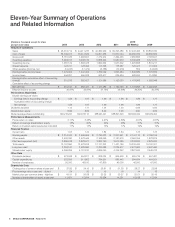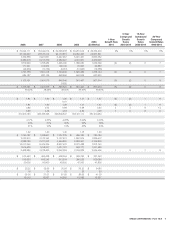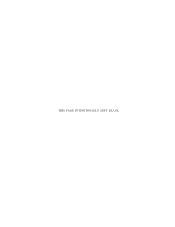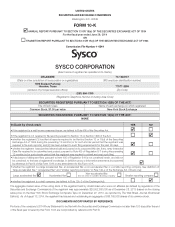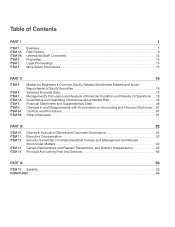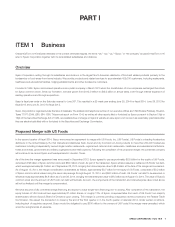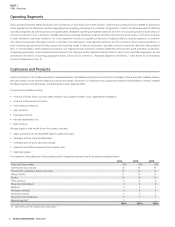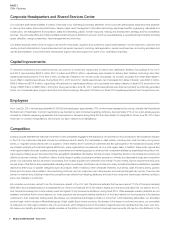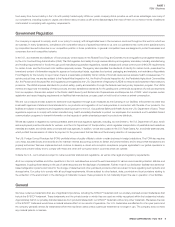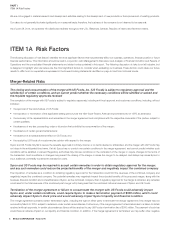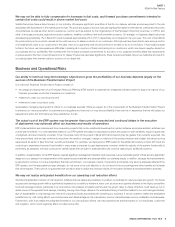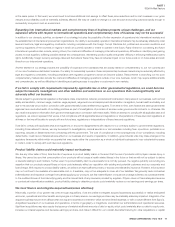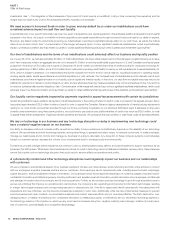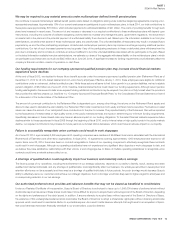Sysco 2014 Annual Report Download - page 17
Download and view the complete annual report
Please find page 17 of the 2014 Sysco annual report below. You can navigate through the pages in the report by either clicking on the pages listed below, or by using the keyword search tool below to find specific information within the annual report.
SYSCO CORPORATION-Form10-K 5
PARTI
ITEM1Business
food-away-from-home industry in the U.S. with publicly traded equity. While our public company status provides us with some advantages over many of
our competitors, including access to capital, we believe it also provides us with some disadvantages that most of them do not have in terms of additional
costs related to complying with regulatory requirements.
Government Regulation
Our company is required to comply, and it is our policy to comply, with all applicable laws in the numerous countries throughout the world in which we
do business. In many jurisdictions, compliance with competition laws is of special importance to us, and our operations may come under special scrutiny
by competition law authorities due to our competitive position in those jurisdictions. In general, competition laws are designed to protect businesses and
consumers from anti-competitive behavior.
In the U.S., as a marketer and distributor of food products, we are subject to the Federal Food, Drug and Cosmetic Act and regulations promulgated thereunder
by the U.S. Food and Drug Administration (FDA). The FDA regulates food safety through various statutory and regulatory mandates, including manufacturing
and holding requirements for foods through good manufacturing practice regulations, hazard analysis and critical control point (HACCP) requirements
for certain foods, and the food and color additive approval process. The agency also speci es the standards of identity for certain foods, prescribes the
format and content of information required to appear on food product labels, regulates food contact packaging and materials, and maintains a Reportable
Food Registry for the industry to report when there is a reasonable probability that an article of food will cause serious adverse health consequences. For
certain product lines, we are also subject to the Federal Meat Inspection Act, the Poultry Products Inspection Act, the Perishable Agricultural Commodities
Act, the Packers and Stockyard Act and regulations promulgated by the U.S. Department of Agriculture (USDA) to interpret and implement these statutory
provisions. The USDA imposes standards for product safety, quality and sanitation through the federal meat and poultry inspection program. The USDA
reviews and approves the labeling of these products and also establishes standards for the grading and commercial acceptance of produce shipments
from our suppliers. We are also subject to the Public Health Security and Bioterrorism Preparedness and Response Act of 2002, which imposes certain
registration and record keeping requirements on facilities that manufacture, process, pack or hold food for human or animal consumption.
We and our products are also subject to state and local regulation through such measures as the licensing of our facilities; enforcement by state and
local health agencies of state and local standards for our products; and regulation of our trade practices in connection with the sale of our products. Our
facilities are subject to inspections and regulations issued pursuant to the U.S. Occupational Safety and Health Act by the U.S. Department of Labor. These
regulations require us to comply with certain manufacturing, health and safety standards to protect our employees from accidents and to establish hazard
communication programs to transmit information on the hazards of certain chemicals present in products we distribute.
We are also subject to regulation by numerous federal, state and local regulatory agencies, including, but not limited to, the U.S. Department of Labor, which
sets employment practice standards for workers, and the U.S. Department of Transportation, which regulates transportation of perishable and hazardous
materials and waste, and similar state, provincial and local agencies. In addition, we are also subject to the U.S. False Claims Act, and similar state statutes,
which prohibit the submission of claims for payment to the government that are false and the knowing retention of overpayments.
The U.S. Foreign Corrupt Practices Act (FCPA) prohibits bribery of public of cials to obtain or retain business in foreign jurisdictions. The FCPA also requires
us to keep accurate books and records and to maintain internal accounting controls to detect and prevent bribery and to ensure that transactions are
properly authorized. We have implemented and continue to develop a robust anti-corruption compliance program applicable to our global operations to
detect and prevent bribery and to comply with these and other anti-corruption laws in countries where we operate.
Outside the U.S., our business is subject to numerous similar statutes and regulations, as well as other legal and regulatory requirements.
All of our company’s facilities and other operations in the U.S. and elsewhere around the world are subject to various environmental protection statutes and
regulations, including those relating to the use of water resources and the discharge of wastewater. Further, most of our distribution facilities have ammonia-
based refrigeration systems and tanks for the storage of diesel fuel and other petroleum products which are subject to laws regulating such systems and
storage tanks. Our policy is to comply with all such legal requirements. We are subject to other federal, state, provincial and local provisions relating to
the protection of the environment or the discharge of materials; however, these provisions do not materially impact the use or operation of our facilities.
General
We have numerous trademarks that are of signi cant importance, including the SYSCO
®
trademark and our privately-branded product trademarks that
include the SYSCO® trademark. These trademarks and the private brands on which they are used are widely recognized within the foodservice industry.
Approximately half of our privately-branded sales are from products labeled with our SYSCO
®
trademark without any other trademark. We believe the loss
of the SYSCO® trademark would have a material adverse effect on our results of operations. Our U.S. trademarks are effective for a ten-year period and
the company generally renews its trademarks before their expiration dates unless a particular trademark is no longer in use. The company does not have
any material patents or licenses.



